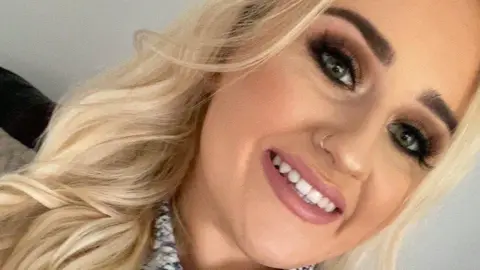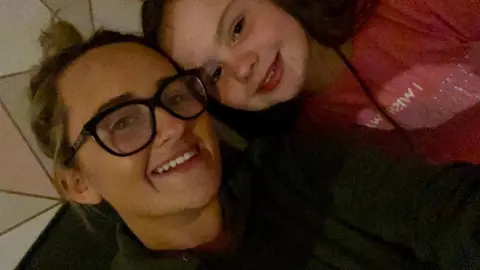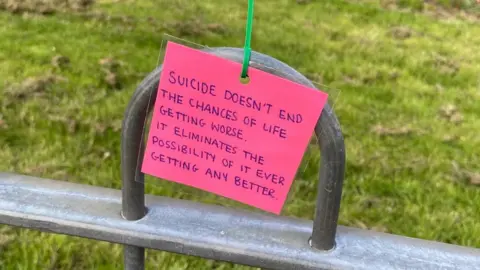Young women and suicide: 'I felt like a shell'
 Lauren Watson
Lauren WatsonWhen Lauren Watson was 24 years old, she thought she wanted to take her own life.
She says grief and a "toxic" relationship after she had her daughter Codie at 16 left her struggling with her mental health.
"I didn't even feel like a human being," Lauren tells Radio 1 Newsbeat.
"I felt like I was a shell, and someone had taken my soul and all of my organs out of me. I felt nothing. I didn't even feel like a person anymore."
 Lauren Watson
Lauren WatsonWhen Lauren attempted to kill herself in August 2018, she survived.
But others don't. New figures from the Office for National Statistics (ONS) show that across England and Wales, the number of women taking their own lives in 2019 was at its highest since 2004.
Deaths of those in the age group 10 to 24 increased from 81 in 2012 to 159 last year.
"That figure doesn't surprise me at all," Lauren says.
During lockdown, she and her friends went to local suicide spots and left notes with kind words on them.
 Lauren Watson
Lauren Watson"We received a lot of messages from doing that, it made me realise a lot more people are suffering than we know.
"People that I knew personally, and never would've thought were having a hard time, were reaching out to say thank you."
'Nobody knew I was suffering'
Lauren says when she was at her lowest, she worried that opening up would make her look like she was "attention seeking".
"I felt like nobody would take me seriously, they'd just think I was having a bad day.
"But when I decided to speak to my friends and family, it made me feel so much better."
Allow X content?
Of the 5,691 people who took their own lives in England and Wales last year, about three quarters were men.
The figures also show the suicide rate for men is at its highest for two decades.
Throughout the pandemic, a number of charities have warned about the impact on mental health of added stress, with jobs and incomes up in the air, coupled with less socialising or being outdoors.
There has also been a significant rise in the number of LGBTQ people seeking suicide prevention support during the UK's lockdown.
Emma Carrington is a manager at Rethink, a charity that advises people who are feeling suicidal or struggling with mental illness.
She says although it's important not to speculate about the reasons behind suicide rates, they have noticed more people calling for emotional support and advice about feeling lonely during lockdown.
Two years on from Lauren's lowest point, she couldn't be more glad she survived.
"I learnt that it's a bad day, not a bad life," she says.

Emma has four main pieces of advice she says she'd give to someone who is struggling:
It's OK to talk
It can sometimes feel quite shameful when we have these thoughts and we feel like no one really cares.
But actually, there are lots of people that do, whether that's friends, family, your GP or an advice line.
Have a crisis plan and recognise your triggers
It's about knowing what can make you feel worse.
When we're down we do things like looking at the exes photos on Facebook, we listen to that sad song, we watch that movie that we used to watch with them, all those sorts of things.
Don't do that!
Stay away from drugs and alcohol
This is not a piece of advice that people always want to hear because when we're feeling low we often turn to this and feel better.
But actually, they reduce our inhibitions. You are much more likely to act on suicidal thoughts if you're taking drugs or alcohol, so stay away from them.
Create a care box
It can be a box, a carrier bag or anything. It's something that you've put things in that make you feel better.
It might be your favourite CD, a letter from someone you care about, your favourite jumper or chocolate bar, anything that makes you feel good.
You can kind of pick it up when you're feeling really low as an act of self care.
For information and support on mental health and suicide, access the BBC Action Line.


